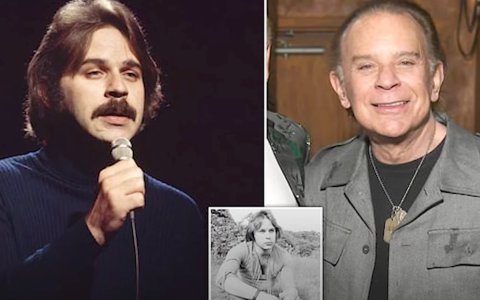Lou Christie remembered: The golden falsetto behind "Lightnin’ Strikes" and a lifetime of song
By
Veronica E.
- Replies 0
For many of us, just hearing the opening notes of “Lightnin’ Strikes” can take us right back—to high school dances, AM radio crackle, and the thrill of young love.
That unmistakable falsetto belonged to Lou Christie, one of the defining voices of the 1960s.
As news of his passing at age 82 spreads, fans across generations are looking back with gratitude on a life filled with music, heart, and timeless charm.
Born Lugee Alfredo Giovanni Sacco in Glenwillard, Pennsylvania, Christie’s musical roots ran deep.
He grew up singing in his church choir, and as he once fondly recalled, his very first standing ovation came during a first-grade Christmas pageant.
That applause sparked something that never faded.
By high school, he was already forming bands—The Crewnecks, then Lugee & The Lions—honing his sound in church basements and gymnasiums.
It wasn’t long before that spark ignited into something bigger.

Also read: Legendary bassist Phil Lesh dies at 84—The Grateful Dead icon's untold legacy revealed
The rise of a teen idol with a daring sound
Christie burst onto the national stage in 1963 with “The Gypsy Cried,” quickly followed by “Two Faces Have I.”
These early hits introduced his signature falsetto and emotional songwriting.
But it was 1966’s “Lightnin’ Strikes” that made him a household name.
The track soared to No. 1 on the Billboard Hot 100 and became an anthem for a generation navigating love, heartbreak, and hope.
Far from playing it safe, Christie also pushed musical boundaries.
His song “Rhapsody in the Rain,” co-written with his longtime collaborator Twyla Herbert, was banned by several radio stations for its bold lyrics.
Yet Christie never apologized for being ahead of his time—he embraced it.
Also read: The story ends too soon: Beloved author passes away at 66 after remarkable late-career revival
A career that weathered every storm
While many '60s artists faded with the British Invasion, Christie found ways to evolve without losing his signature sound.
His take on “Beyond the Blue Horizon” gained new life in the Oscar-winning film Rain Man and the family drama A Home of Our Own, introducing him to a fresh audience.
Even into his 80s, Christie continued to perform.
He credited his enduring voice to a simple, healthy lifestyle.
“I’m not a liquor drinker, I don’t smoke, and I don’t go out to loud places,” he once said.
“I live a peaceful life, and I think that helps.”
But more than clean living, it was his love for music—and his fans—that kept him going.
Also read: Beloved “General Hospital” star passes away—Fans heartbroken at 85
A deep bond with his audience
Throughout his life, Christie never took his audience for granted.
He often spoke of the joy he felt connecting with fans, whether on a stage in England or a tour stop in the American South.
“That’s the nicest part of my career,” he shared. “I’ve had incredibly devoted fans.”
That sense of gratitude and mutual appreciation shone through every note he sang.
His concerts weren’t just performances—they were reunions with old friends.
Also read: Sports world silenced: The voice of the NFL passes away
Why his legacy still matters
Lou Christie didn’t just top charts—he touched hearts.
His music captured the highs and lows of young love, but it also held a deeper truth that resonated far beyond the ‘60s.
His voice was unforgettable, yes—but it was his honesty, risk-taking, and connection with people that made him truly special.
In an age where pop stars often come and go, Christie stands out as a reminder of what it means to create something lasting.
His story proves that genuine talent—and genuine heart—never go out of style.
Rest in peace, Lou. And thank you for the music.
Read next: Legendary voice behind Emperor Palpatine in Star Wars passes away—remembering the extraordinary legacy of Clive Revill

Did you slow-dance to “Two Faces Have I”? Sing along to “Lightnin’ Strikes” on your car radio? Maybe you saw him live in concert years—or even decades—ago. We’d love to hear your stories and memories. Let’s celebrate the man whose voice helped shape the soundtrack of our lives!
That unmistakable falsetto belonged to Lou Christie, one of the defining voices of the 1960s.
As news of his passing at age 82 spreads, fans across generations are looking back with gratitude on a life filled with music, heart, and timeless charm.
Born Lugee Alfredo Giovanni Sacco in Glenwillard, Pennsylvania, Christie’s musical roots ran deep.
He grew up singing in his church choir, and as he once fondly recalled, his very first standing ovation came during a first-grade Christmas pageant.
That applause sparked something that never faded.
By high school, he was already forming bands—The Crewnecks, then Lugee & The Lions—honing his sound in church basements and gymnasiums.
It wasn’t long before that spark ignited into something bigger.

Remembering Lou Christie and the music that touched generations. Image Source: YouTube / The Express Tribune.
Also read: Legendary bassist Phil Lesh dies at 84—The Grateful Dead icon's untold legacy revealed
The rise of a teen idol with a daring sound
Christie burst onto the national stage in 1963 with “The Gypsy Cried,” quickly followed by “Two Faces Have I.”
These early hits introduced his signature falsetto and emotional songwriting.
But it was 1966’s “Lightnin’ Strikes” that made him a household name.
The track soared to No. 1 on the Billboard Hot 100 and became an anthem for a generation navigating love, heartbreak, and hope.
Far from playing it safe, Christie also pushed musical boundaries.
His song “Rhapsody in the Rain,” co-written with his longtime collaborator Twyla Herbert, was banned by several radio stations for its bold lyrics.
Yet Christie never apologized for being ahead of his time—he embraced it.
Also read: The story ends too soon: Beloved author passes away at 66 after remarkable late-career revival
A career that weathered every storm
While many '60s artists faded with the British Invasion, Christie found ways to evolve without losing his signature sound.
His take on “Beyond the Blue Horizon” gained new life in the Oscar-winning film Rain Man and the family drama A Home of Our Own, introducing him to a fresh audience.
Even into his 80s, Christie continued to perform.
He credited his enduring voice to a simple, healthy lifestyle.
“I’m not a liquor drinker, I don’t smoke, and I don’t go out to loud places,” he once said.
“I live a peaceful life, and I think that helps.”
But more than clean living, it was his love for music—and his fans—that kept him going.
Also read: Beloved “General Hospital” star passes away—Fans heartbroken at 85
A deep bond with his audience
Throughout his life, Christie never took his audience for granted.
He often spoke of the joy he felt connecting with fans, whether on a stage in England or a tour stop in the American South.
“That’s the nicest part of my career,” he shared. “I’ve had incredibly devoted fans.”
That sense of gratitude and mutual appreciation shone through every note he sang.
His concerts weren’t just performances—they were reunions with old friends.
Also read: Sports world silenced: The voice of the NFL passes away
Why his legacy still matters
Lou Christie didn’t just top charts—he touched hearts.
His music captured the highs and lows of young love, but it also held a deeper truth that resonated far beyond the ‘60s.
His voice was unforgettable, yes—but it was his honesty, risk-taking, and connection with people that made him truly special.
In an age where pop stars often come and go, Christie stands out as a reminder of what it means to create something lasting.
His story proves that genuine talent—and genuine heart—never go out of style.
Rest in peace, Lou. And thank you for the music.
Read next: Legendary voice behind Emperor Palpatine in Star Wars passes away—remembering the extraordinary legacy of Clive Revill
Key Takeaways
- Lou Christie, known for his soaring falsetto and 1966 hit “Lightnin’ Strikes,” passed away at 82. His representative confirmed the news, but no cause of death was disclosed.
- He rose to fame in the early 1960s with hits like “The Gypsy Cried,” “Two Faces Have I,” and the controversial “Rhapsody in the Rain,” which was banned on some radio stations.
- His music saw renewed popularity through film appearances, including Rain Man and A Home of Our Own.
- Christie continued performing into his 80s, crediting his longevity to a peaceful lifestyle and his deep appreciation for his fans.
Did you slow-dance to “Two Faces Have I”? Sing along to “Lightnin’ Strikes” on your car radio? Maybe you saw him live in concert years—or even decades—ago. We’d love to hear your stories and memories. Let’s celebrate the man whose voice helped shape the soundtrack of our lives!






